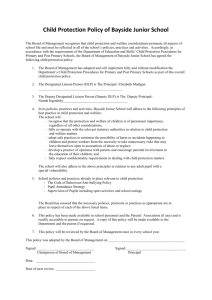Research Leave Scheme
advertisement
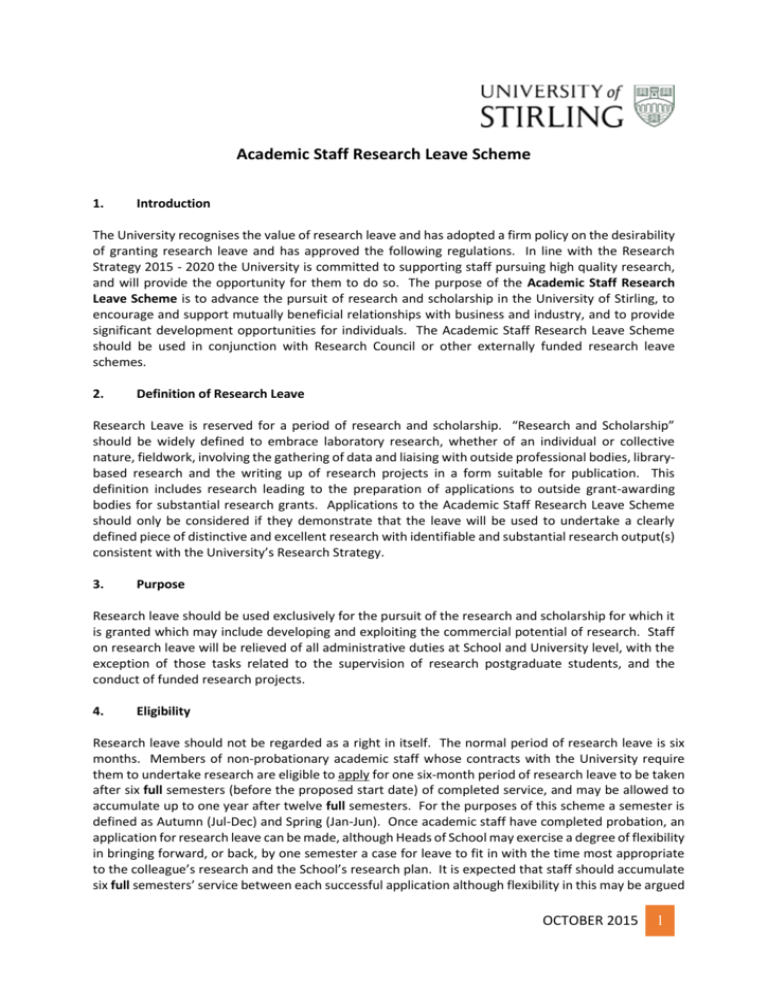
Academic Staff Research Leave Scheme 1. Introduction The University recognises the value of research leave and has adopted a firm policy on the desirability of granting research leave and has approved the following regulations. In line with the Research Strategy 2015 - 2020 the University is committed to supporting staff pursuing high quality research, and will provide the opportunity for them to do so. The purpose of the Academic Staff Research Leave Scheme is to advance the pursuit of research and scholarship in the University of Stirling, to encourage and support mutually beneficial relationships with business and industry, and to provide significant development opportunities for individuals. The Academic Staff Research Leave Scheme should be used in conjunction with Research Council or other externally funded research leave schemes. 2. Definition of Research Leave Research Leave is reserved for a period of research and scholarship. “Research and Scholarship” should be widely defined to embrace laboratory research, whether of an individual or collective nature, fieldwork, involving the gathering of data and liaising with outside professional bodies, librarybased research and the writing up of research projects in a form suitable for publication. This definition includes research leading to the preparation of applications to outside grant-awarding bodies for substantial research grants. Applications to the Academic Staff Research Leave Scheme should only be considered if they demonstrate that the leave will be used to undertake a clearly defined piece of distinctive and excellent research with identifiable and substantial research output(s) consistent with the University’s Research Strategy. 3. Purpose Research leave should be used exclusively for the pursuit of the research and scholarship for which it is granted which may include developing and exploiting the commercial potential of research. Staff on research leave will be relieved of all administrative duties at School and University level, with the exception of those tasks related to the supervision of research postgraduate students, and the conduct of funded research projects. 4. Eligibility Research leave should not be regarded as a right in itself. The normal period of research leave is six months. Members of non-probationary academic staff whose contracts with the University require them to undertake research are eligible to apply for one six-month period of research leave to be taken after six full semesters (before the proposed start date) of completed service, and may be allowed to accumulate up to one year after twelve full semesters. For the purposes of this scheme a semester is defined as Autumn (Jul-Dec) and Spring (Jan-Jun). Once academic staff have completed probation, an application for research leave can be made, although Heads of School may exercise a degree of flexibility in bringing forward, or back, by one semester a case for leave to fit in with the time most appropriate to the colleague’s research and the School’s research plan. It is expected that staff should accumulate six full semesters’ service between each successful application although flexibility in this may be argued OCTOBER 2015 1 by the Head of School. Length of service is not in itself sufficient to gain research leave, though it may be considered by the Head of School as an additional positive criterion in an application after consideration of research-related criteria. 5. Criteria Applicants for research leave should address each of these criteria in their applications. In deciding whether to recommend the approval of an application for research leave, the Head of School, with advice from School research directors, should consider the extent to which the application addresses the following questions, in the light of the career stage of the applicant, and in addition to any supplementary School criteria: 1. Can the applicant demonstrate evidence of an excellent record of research achievement commensurate of their career stage, including the effective conduct of independent research, publication, success in developing research proposals which attract external funding, and initiative in developing knowledge exchange activities over the period since the last research leave ended? 2. Can the applicant demonstrate a track record of recruitment and successful supervision of PhD students, commensurate with their career stage? 3. Were the planned objectives of any previous period of research leave met? 4. Will the research leave lead to substantial research outputs; for example, Will the proposed research activity lead to the completion of internationally excellent substantial research publications (e.g. monographs, journal articles); is there a clear plan to publication in the proposal? Have any requests for external funding been made in conjunction with this proposed research activity? Will a component of the planned research leave include the preparation of proposals for funding for future projects, to be undertaken at the end of the applicant’s research leave period? Are there other substantive and valuable research outputs that will be achieved? Has the research proposal effectively presented clear pathways to impact? 5. Is the plan for the research given in sufficient detail in the application? Is the planned research commensurate with the period of leave requested? 6. Eligible Activities The following are illustrative of research outputs which are considered ‘substantial’ and therefore eligible for the Research Leave Scheme: At least two research papers/articles publishable in high quality referred international journals; A research monograph (authored, co-authored); OCTOBER 2015 2 The submission of a major RCUK or similar research proposal, commensurate with the career stage of the applicant; These are examples of substantial output and not strict definitions of eligible output. Other substantive research outputs which are in keeping with the University and School research strategy may also be eligible. In keeping with all assessment, the application must clearly demonstrate the value of these outputs and the likelihood that they will be achieved. If an applicant is unsure then advice should be sought from the School’s Director of Research or Head of School who may then consult with a member of the advisory panel. Other related outputs which enhance research reputation (for example, conference presentations, seminars, unpaid secondments or fellowships, policy briefings, the membership of research funding consortia) will strengthen applications, but are not sufficient research outputs to support an application in themselves. 7. Research Resources Where teaching assistance is bought in to cover the research leave period of an academic member of staff this cost will be met by the School unless external funding has been secured to cover this cost. Research resources are distinct from the resource implications of being granted research leave. They are defined here as the resources necessary for the actual conduct of research, for example, travel and subsistence expenses, conference fees, library fees, research support, and so on. The applicant must show that he or she has identified appropriate means of covering these research resources. Applications to the Research Leave Scheme should state whether the conduct of the research in question is dependent on the success of supporting applications for research resources. Please note that: i) Staff on probation are not entitled to take research leave until they have successfully completed their probationary period ii) Semesters of leave granted under other schemes e.g. Leave of Absence, do not normally count towards entitlement to research leave To achieve a balance between individual and School needs, the period of leave will normally begin one month after the end of the previous semester. Where leave is granted for two consecutive periods, it will be for twelve months normally beginning one month after the end of the previous semester. Precise dates for the beginning and end of the research period should be agreed at School level, and notified to HR & OD services. It is assumed that, normally, research leave will cover a period during which teaching and administrative duties would otherwise have been undertaken. This principle will also be applied in the exceptional circumstances where applicants are involved in courses of twelve months' duration, and where, for example, the period of leave might run from the middle of one semester to the middle of the next. 8. Absence Staff who require to be absence from the University (paid or unpaid) continue to accrue semesters of service for research leave purposes. OCTOBER 2015 3 If a member of staff falls sick during a period of Research leave agreed under the University Scheme, the period of research leave will not normally be extended. The absence will, however, be taken into account when considering the subsequent Research Leave Report, particularly where expected outputs have been adversely affected by the absence. 9. Staff on Fixed-Term Contracts Fixed term staff who have six continuous semesters of service are eligible to apply subject to the proviso that research leave will not be granted for the last semester of a fixed term contract. 10. Retirement and Resignations Applications to take research leave immediately prior to retirement or resignation will not normally be agreed, unless an exceptional case can be made for the benefit to the university. 11. Research Leave Applications Applications for research leave should be made using the appropriate current standard University form available from the HR and OD website and be accompanied by an up to date curriculum vitae which should contain precise details of the applicant's ongoing teaching, research, supervisory and administrative commitments. 12. The Route of Applications i. Submission in the first instance is to the Head of School whose role will be primarily evaluative. (If the applicant is a Head of School please go to iv). The Head of School will arrange for internal peer review, in accordance with the School’s peer review policy. At this stage questions concerning the research record of the applicant, the viability of the proposed research scheme for which the research is sought will be examined in detail and adjusted if necessary. The Head of School will work with the School Research Director who will advise on the extent to which the proposed work is in accordance with School research plans. ii. The Head of School will countersign the application form, and will submit the full documentation to HR & OD services. If, for any reason, a Head of School is unable to support an application, this should be fully discussed with the member of staff. iii. The fully countersigned application, accompanied by the standard format curriculum vitae will then be forwarded by HR & OD services to the Senior Deputy Principal and Deputy ViceChancellor. The Senior Deputy Principal and Deputy Vice-Chancellor will convene an advisory panel of the Deans of Research Impact and Research Enhancement, the Director of Research and Enterprise, and members of the Professoriate from relevant Schools to assist him/her in assessing the applications. iv. Where the applicant is a Head of School, discussions are required to take place between the Head of School and the appropriate Deputy Principal regarding suitable arrangements for the cover of the Headship of School during any agreed period of leave. Once such discussions have taken place, the application, (countersigned by the Deputy Principal), should be forwarded to HR & OD services for onward submission to the Senior Deputy Principal and Deputy ViceChancellor for final approval (as above). OCTOBER 2015 4 v. Applications for research leave from Heads of School need to be reported to Court in order to ensure that appropriate cover within the relevant School is made. Notification of such applications will be made via HR & OD services to the Secretary of Court. vi. The Senior Deputy Principal and Deputy Vice-Chancellor has the authority on behalf of the advisory panel, to reject applications which are considered to be weak or inappropriate. Timetable and Critical dates for Autumn 2016 / Spring 2017 applications: Please note: Research Leave application timescales have been adjusted to better fit with school planning and resourcing. DATE Process opens for applications Deadline for applications to be submitted to the Heads of School. Head of School and School Research Director meet to consider applications. Where the application is supported by the School at this initial stage, the Head of School must provide their evaluation of the applicant’s research proposal, along with details of arrangements made for the teaching of the applicant’s courses and supervision. Monday 5th October 2015 Friday 27th November 2015 Monday 30th November 2015– Friday 11th December 2015 Where the application is not supported by the School, the Head of School is responsible for providing feedback to candidates on the status of their application. Schools advise HR&OD of the applications to proceed at this initial stage and provide the following information via ResearchLeave@stir.ac.uk for each applicant. CV Application form (including previous research leave report if applicable) HR & OD issue applications to the Research Leave Advisory Panel for final consideration No later than Monday 14th December 2015 Wednesday 16th December 2015 Research leave advisory panel meeting Week Commencing 25th January 2016 Outcomes and feedback communicated to all Heads of School and candidates Week Commencing 8th February 2015 OCTOBER 2015 5 [Very exceptionally, out of cycle applications may be considered where the member of staff is, for example, going abroad and has to apply for external grant funding]. Alterations to an approved research proposal Alterations to a research proposal which has already been approved may be necessary due to unforeseen circumstances, either immediately prior to the period of research leave, or during it. In either case, the member of staff must notify their Head of School/Deputy Principal (depending on status of applicant) or Senior Deputy Principal and Deputy Vice-Chancellor, immediately, and this information should then proceed speedily along the same route as that outlined for applications 13. Research Leave Reports Research Leave Reports must be submitted on the standard University form within four weeks of return to normal duties. The forms are available from HR and OD website. The reports are approved in the same way as applications i.e. Head of School/Deputy Principal and Senior Deputy Principal and Deputy Vice-Chancellor/advisory panel. Each report should, therefore, be evaluated, approved and signed by the Head of School/Deputy Principal. It will be the responsibility of the Head of School to ensure that a report is forthcoming within the stipulated time. Approved reports should then be forwarded to HR & OD services via the research leave mailbox ResearchLeave@stir.ac.uk for submission to the Senior Deputy Principal and Deputy Vice-Chancellor for final approval by the advisory panel. In cases where a research report is deemed to be inadequate, and where it is established that the inadequacy is much more than the matter of report, but is a question of non-productivity, the member of staff will be required to meet formally with her/his Head of School and an attempt should be made to facilitate the successful completion of the project for which the leave was granted. If, after investigation, no successful solution is forthcoming, the Senior Deputy Principal and Deputy Vice-Chancellor may take a firm decision to withdraw future research leave for the member of staff. A member of staff may seek to have this decision reversed by applying to the Research Committee, where an ad hoc sub-committee may be set up to consider such cases. 14. Remuneration during Research Leave and Annual Leave Arrangements Remuneration Normally staff on research leave will be entitled to full pay. However, where staff undertake a project which means that they receive remuneration from an outside body, different rules will apply. In such cases the level of stipend from the University during research leave will be determined by the Senior Deputy Principal and Deputy Vice-Chancellor after consultation with the member of staff involved and the Director of HR and OD department, as appropriate. The Senior Deputy Principal and Deputy ViceChancellor will take into consideration the level of remuneration obtained from elsewhere, the cost of living, cost of fare(s), unavoidable commitments at home, etc. The aim in fixing the level of 'home' salary will be to ensure that University funds are not paid out in cases where substantial profit from the research arrangements might accrue. In most cases of research leave, superannuation and national insurance contributions will be maintained at the University's expense. However, when staff receive remuneration from an outside body during a period of research leave, the position with regard to superannuation and national insurance contributions will be determined at the same time as the level of University stipend is agreed. OCTOBER 2015 6 Financial assistance may be available within the University for Travel Arrangements and applications should be made to the Head of School. 15. Head of School's Allowance In the absence of a Head of School on research leave, the Heads of School allowance will be payable to any Acting Head of School appointed by the Senior Deputy Principal and Deputy Vice-Chancellor. The allowance normally paid to Heads of Schools ceases during their research leave when another member of staff takes over as Head of School. 16. Leave of Absence – Academic Staff Leave of Absence, other than research leave, for periods of teaching or research elsewhere, or certain other purposes, can be granted by the Senior Deputy Principal and Deputy Vice-Chancellor upon the recommendation of the Head of School concerned. The level of stipend and the position of superannuation and national insurance contributions during such leave will be determined by the Senior Deputy Principal and Deputy Vice-Chancellor after consultation with the member of staff involved and the Director of HR and OD. Leave of Absence will not normally count towards entitlement to apply for research leave. OCTOBER 2015 7
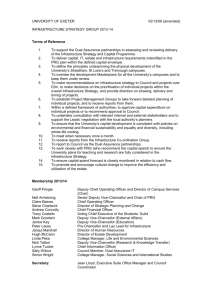
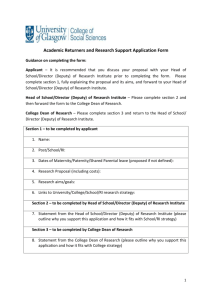
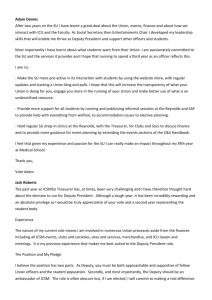
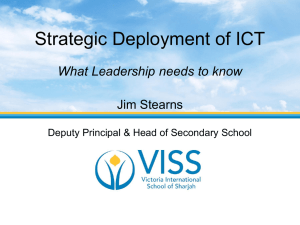
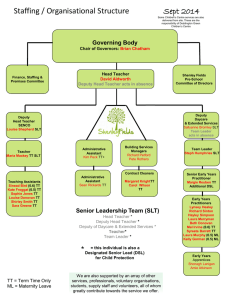

![Deputy Academic Head [word] - Administration, Monash University](http://s3.studylib.net/store/data/005854631_1-5f7c00c506360b5f58d2432180475e12-300x300.png)
